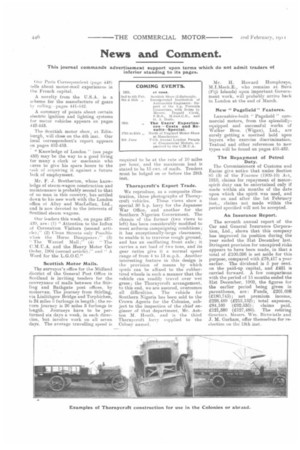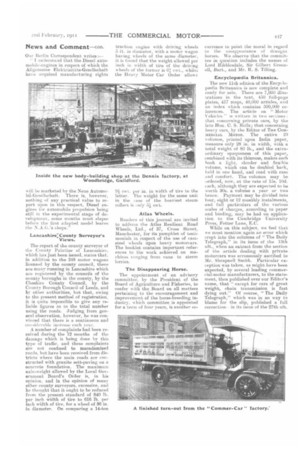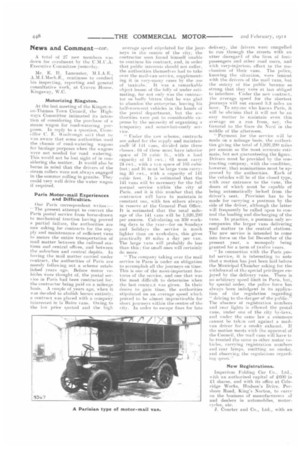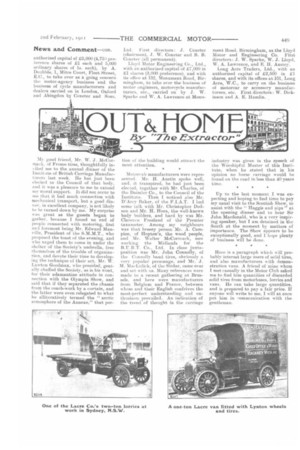News and Comment.
Page 10

Page 11

Page 12

Page 13

If you've noticed an error in this article please click here to report it so we can fix it.
This journal commands advertisement support upon terms which do not admit traders of inferior standing to its pages.
Our Paris Correspondent i,page 448) tells about motor-mail experiences in the French capital.
A novelty from the U.S.A. is a scheme for the manufacture of gears by rolling pages 441-442.
A summarv of points about certain electric ignition and lighting systems for motor vehicles appears on pages 442-443.
The Scottish motor show, at Edinburgh, will close on the 4th inst. Our local correspondent's report appears OD pages 452-453.
"Knowledge of London " (see page 450) may be the way to a good living for many a clerk or mechanic who cares to give his spare hours to the task of acquiring it against a future lack of employment.
Mr. F. J. Brethertort, whose knowledge of steam-wagon construction and maintenance is probably second to that of no man in this country, has settled down to his new work with the London office of Alley and MacLellan, Ltd., and is now devoted to the interests of Sentinel steam wagons.
Our leaders this week, on pages 437439, are: (1) "Attention to the Influx of Coronation Visitors (second article) ;" (2) Clean Streets only Possible when the Horse Disappears ;" (3)
The Wasted Mall ;" (4) " The C.M.U.A. and the Heavy Motor Car Order, 1904 (second article) ;" and " A Word for the L.G.O.C."
Scottish Motor Mails.
The surveyor's office for the Midland district of the General Post Office in Scotland is inviting tenders for the conveyance of mails between the Stirling and Bathgate post offices, by motorvan. The Journey from Stirling, via Linlithgow Bridge and Torphichen, is 24 miles 5 furlongs in length ; the return journey is 26 miles 3 furlongs in length. Journeys have to be performed six days a week, in each direction, but involve work on all seven days. The average travelling speed is required to be at the rate of 10 miles per hour, and the maximum load is stated to be 15 cwt. of mails. Tenders must be lodged on or before the 28th inst.
Thornycroft's Export Trade.
We reproduce, as a composite illustration, three photographs of Thornycroft vehicles. These views show a special 30 h.p. lorry for the Japanese War Office, and another for the Southern Nigerian Government. The chassis of the former (two views to left) has been considerably modified to meet arduous campaigning conditions; it has exceptionally-large clearances, to enable it to traverse rough ground, and has an oscillating front axle ; it carries a net load of two tons, and its gear ratios give it a normal speed range of from 4 to 13 m.p.h. Another interesting feature in this design is the provision of means by which spuds can be affixed to the rubbertired wheels in such a manner that the vehicle can readily travel over wet grass; the Thornycroft arrangement, to this end, we are assured, overcomes all difficulties. The vehicle for Southern Nigeria has been sold to the Crown Agents for the Colonies, subject to the inspection of the chief engineer of that department, Mr. Ashton M. Heath. and is the third Thornycroft lorry supplied to the Colony named. Mr. H. Howard Humphreys, M.I.Mech.E., who remains at Suva (Fiji Islands) upon important Government work, will probably arrive back in London at the end of March.
New " Pagefield " Features.
Lancashire-built " Pagefield " commercial motors, from the splendidl:„ equipped and successful works of Walker Bros. (Wigan), Ltd., are surely getting a merited hold upon buyers who exercise discrimination. Textual and other references to new types will be found on pages 451452.
Duty. The Repayment of Petrol The Commissioners of Customs and Excise give notice that under Section 85 (3) of the Finance (1909-10) Act, 1910, claims for repayment of motorspirit duty can be entertained only if made within six months of the date upon which the spirit was used, and that on and after the 1st February inst., claims not made within the period specified will not be accepted.
An Insurance Report.
The seventh annual report of the Car and General Insurance Corporation, Ltd., shows that this company has improved its position during the year ended the 31st December last. Stringent provision for unexpired risks appears to have been made, in that a total of £100,096 is set aside for this purpose, compared with £78,417 a year earlier. The dividend is 5 per cent. on the paid-up capital, and £491 is carried forward. A few comparisons with the period of 15 months ended the 31st December, 1909, the figures for the earlier period being given in parentheses, are: Funds, 2201.698 (£180,745); net premium income, £226,489 (£215,152); total expanses, £84,160 (£92,535); claims paid, £121,580 (£127,486). The retiring directors, Messrs. Wm. Birtwistle and J. M. Gorham, offer themselves for reelection on the 13th inst.
Our Berlin Correspondent writes :I understand that the Diesel automobile-engincs in respect of which the Allgenneine Flektrizitiits-Gesellschaft have acquired manufacturing rights will be marketed by the Neue Automo
bil-Oeselischaft. There is, however, nothing of any practical value to report upon in this respect, Diesel engines for automobile propulsion being still in the experimental stage of development, some months must elapse before the first adapted model leaves the N.A.G.'s shops."
Lancashire: County Surveyor's Views.
The report of the county surveyor of the County Palatine of Lancashire, which has just been issued, states that, in addition to the 248 motor wagons licensed by the county council, there are many running in Lancashire which are registered by the councils of the county boroughs in the county, by the Cheshire County Council, by the County Borough Council of Leeds, and by other authorities, but that, owing to the present method of registration, it is quite impossible to give any reliable figures as to the total number using the roads. Judging from general observation, however, he was convinced that there is a continuous and considereble inerense each year.
A number of complaints had been received during the 12 months of the damage which is being done by this type of traffic, and these complaints are not confined to macadamized roads, but have been received from districts where the main roads are constructed with granite sett-paving on a concrete foundation. The maximum axle-weight allowed by the Local Government Board's Order is, in his opinion, and in the opinion of many other county surveyors, excessive, and he thought that it ought to be reduced from the present standard of 840 lb. per inch width of tire to 616 lb. per inch width of tire, for a wheel of 36 in. in diameter. On comparing a. 14-ton
traction engine with driving wheels 3 ft. in diameter, with a motor wagon having wheels of the same diameter, it is found that the weight allowed per inch in width of tire of the driving
wheels of the former is ewt., whilst the Heavy Motor Car Order allows cwt. per in. in width of tire to the latter. The weight for the same unit in the case of the heaviest Stearn rollers is °illy 31 cwt.
Atlas Wheels.
Readers of this journal are invited to address the Atlas Resilient Road Wheels, Ltd., of 37, Cross Street, Manchester, for its pamphlet of testimonials in respect of the use of caststeel wheels upon heavy motorcars. The booklet contains important references to the work achieved on machines ranging from vans to steam lorries.
The Disappearing Horse.
The appointment of an advisory committee, by the President of the Board of Agriculture and Fisheries, to confer with the Board on all matters pertaining to the. encouragement and improvement of the horse-breeding industry, which committee is appointed for a term of four years, is another oc
currence to point the moral in regard to the oiiippearanCe it draught horses. We observe that the committee in question includes the names of Lord Ribblesdale, Sir Gilbert Greenall, Bart., and Mr. R. S. Tilling.
Encyclopaedia Britannica.
The new 11th edition of the EncyclepLedia Britannica is now complete and ready for sale. There are 7,000 illustrations in the text, 450 full-page plates, 417 maps, 40,000 articles, and an index which contains 300,000 references. The article on " Motor Vehicles " is written in two sections: that concerning private cars, by the late Hon. C. S. Rolls; that concerning heavy cars, by the Editor of TRE ComIIMICIAL MOTOR. The entire 22 volumes, printed upon India pa-per, measure only 28 in. in width, with a total weight of 80 lb., and the extraordinary opaqueness of this paper, combined with its thinness, makes each hook a light, slender and flexible volume, which can be doubled back, held in one hand, and read with ease and comfort_ The volumes may be ordered, now, at the rate of 15s. 10d. each, although they are expected to be worth 30s. a volume a year or twe hence. Payment may be divided into four, eight or 12 monthly instalments, and full particulars of the various scales of charges, according to paper and binding, may be had on application to the Cambridge University Press, Fetter Lane, E.C.
While on this subject, we feel that we must mention again an error which erept into the columns of "The Daily Telegraph," in its issue of the 13th ult., when an extract from the see-tion of the article dealing with private • motorcars was erroneously ascribed to Mr. Shrapnell Smith. Particular exception was taken, as might have been expected, by several leading commercial-motor manufacturers, to the statement, then published over our Editor's name, that " except for cars of great weight, chain transmission is fast dying out." Of course, " The .Daily Telegraph," which was in no way to blame for the slip, published a full correction-in its issue of the 27th ult.
A total of 27 new nwrnbers was down for eitrolwent by the C.M.U.A. Executive Committee yesterday.
Mr. E. H. Lancaster, AI.I.A.F,., A.M.I.Mech.E., continues to conduct his inspecting, reporting and general consultative work, at Craven House, Kingsway, W.C.
Motorizing Kingston.
At the last meeting of the Kingstoeon-Thames Town Council, the Highways Committee intimated its intention of considering the purchase of a steam wagon for road-watering purposes. In reply to a question, Colin(Alio'. C. E. IVoolrougn sail that he was aware that some authorities used the chassis of road-watering wagons for haulage purposes when the wagons were not needed for road watering. This would not be lost sight of in considering the matter. It would also he borne in mind that the drivers of the steam rollers were not always engaged in the summer rolling in granite. The could very well drive the water wagon if required.
Paris Motor-mail Experiences and Difficulties.
Our Paris correspondent writes:— The present attempt to convert the Paris postal service from horse-drawn to mechanical traction having proved a partial failure, the authorities are now asking for contracts for the supply and maintenance of sufficient vans to assure the entire transportation of mail matter between the railroad stations and central offices, and between the suburban and central depots. In having the mail matter carried under contract, the authorities of Paris are morely following out a scheme established years ago. Before motor vehicles were thought of, the postal service in Paris had been contracted for, the contractor being paid on a mileage basis. A couple of years ago, when it was decided to abolish horses entirely, n contract was placed with a company interested in In Buire vans. Owing to the low pricequoted and the high average speed stipulated for the journeys in the centre of the city, the contractor soon found himself unable to continue his contract, and, in order that public interests should not suffer, the authorities themselves had to take over the mail-van service, supplementing it in very-many cases by the use of taxicabs. It was a remarkable object lesson of the folly of under estimating, for not only was the contractor so badly hitten that he was glad to abandun the enterprise, leaving his half-worn-out vehicles in the hands of the postal department, but the authorities were put to considerable expense by the necessity of organizing a temporary aid somewhat-costly service.
" 17nder the new scheme, contracts are asked for the supply and maintenan4 ■if 141 vans, divided into three classes: ($4 of these must have interior space of 70 cubic ft., with a load capacity oh l mt.; 61 must carry 24 eat., with a van slim* of 105 (ethic feet ; and 16 mist he large vans carrying 35 ewt., with a capacity of 141 cubic feet. It is estimated that the 141 vans will he necessary for the full normal service within the city of Paris, and it is this number that the contractor will have to maintain in constant use, with ten others always in reserve at the General Post Office. It is estimated that the total mileage of the 141 vans will be 1,926,290 per annum. Calculating on 350 working days in the year—for on Sundays and holidays the service is much lighter than on week-days, this gives practically 40 miles a day per van. The large vans will probably do less than this tile small ones will certainly do more.
" The company taking over the mail service in Paris is under an obligation to accomplish all the journeys on time. This is one of the most-important features of the service, and one that was the most difficult to determine when the last contrast was given. In their desire togain time, the authorities stipulated on an average speed which proved to be almost impraetivahle for short journeys within the centre of the city. In order to escape fines for late delivery, the drivers were compelled to run through the streets with an utter disregard of the lives of footpassengers and other road users, and with very-injuriote, effect to the mechanism of their vans. The police, knowing the situation, were lenient with the drivers of the mail vans, but the outcry of the public became so strong that they were at last obliged to interfere. Under the new contract, the average speed for the shortest journeys will not exceed 9.3 miles an hour. To anyone who knows Paris, it will be obvious that it will not be an easy matter to maintain even this average on a run from, say, the General to the Gare du Nord in the middle of the afternoon.
" Payment for the service will be made on a mileage basis, the authorities giving the total of 1,926,290 miles per annum as the most accurate estimate, but not guaranteeing the figure. Drivers must be provided by the contracting company, with the condition, however. thatnominations must be approved by the authorities. Each of the vehicles will be of the closed type, with rear entrance to the vans, the doors of which must be capable of being automatically locked from the driver's seat. Provision has to be made for carrying a postman by the side of the driver, although the latter will frequently be called upon to control the loading and discharging of the vans. In practice, a postman only accompanies the larger vans delivering mail matter to the central stations. The new service is intended to come into force on the 1st December of the present year, a monopoly being granted for a term of twelve years.
" In connection with the Paris postal service, it is interesting to note that a motion has just been laid before the Municipal Chamber asking for the withdrawal of the special privileges enjoyed by the delivery vans. There is no arbitrary speed limit in Paris, but, by special order, the police force has always been indulgent in its application of the regulation regarding " driving to the danger of the public." The absence of registration numbers and rear lights is allowed the postal vans, under one of the city by-laws, and ender the same law a summons cannot be takon out against a mail
van driver for a smoky exhaust. If the motion meets with the approval or the Council, the mail vans will have tir be treated the same as other motor vehicles, carrying registration numbers and rear lamps. emitting no smoke, and observing the regulations regarding .-ipeeu
New Registrations.
Imperium Folding Car Co., Ltd., with an authorized capital of £600 in £1 shares, and with its office at Coleridge Works, Hudson's Drive, Pershore Road, King's Norton, to carry on the business of manufacturers of and dealers in automobiles, motorcycles, etc.
J. Coxeter and Co., Ltd., with an
authorized capital of £5,000 (4,75J pre ference shares of each and 5,000 ordinary shares of is each), by A. Doubble, 1, Mitre Court, Fleet Street, EC., to take over as a going concern the motor-agency business and the business of cycle manufacturers and dealers carried on in London, Oxford aud Abingdon by Coxeter and Sons, Ltd. First directors J. Coxeter (chairman), J. W. Coxeter and B. B. Coxeter (all permanent).
Lloyd Motor Engineering Co., Ltd., with an authorized capital of £7,000 in £1 shares (3,000 preference), and with its office at 132, Monument Road, Birmingham, to take over the business of motor engineers, motorcycle manufacturers, etc., carried on by J. W. Sparke and W. A. Lawrence at Menu
ment Road, Birmingham, as the Lloyd Motor and Engineering Co. First directors: J. W. Sparke, W. J. Lloyd, W. A. Lawrence, and E. H. Anstey.
Long Acre Traders, Ltd., with an authorized capital of £2,500 in i1 shares, and with its offices at 101, Long Acre, W.C., to carry on the business of motorcar or accessory manufacturers, etc. First directors: W. Dickinson and A. E, Hamlin,






















